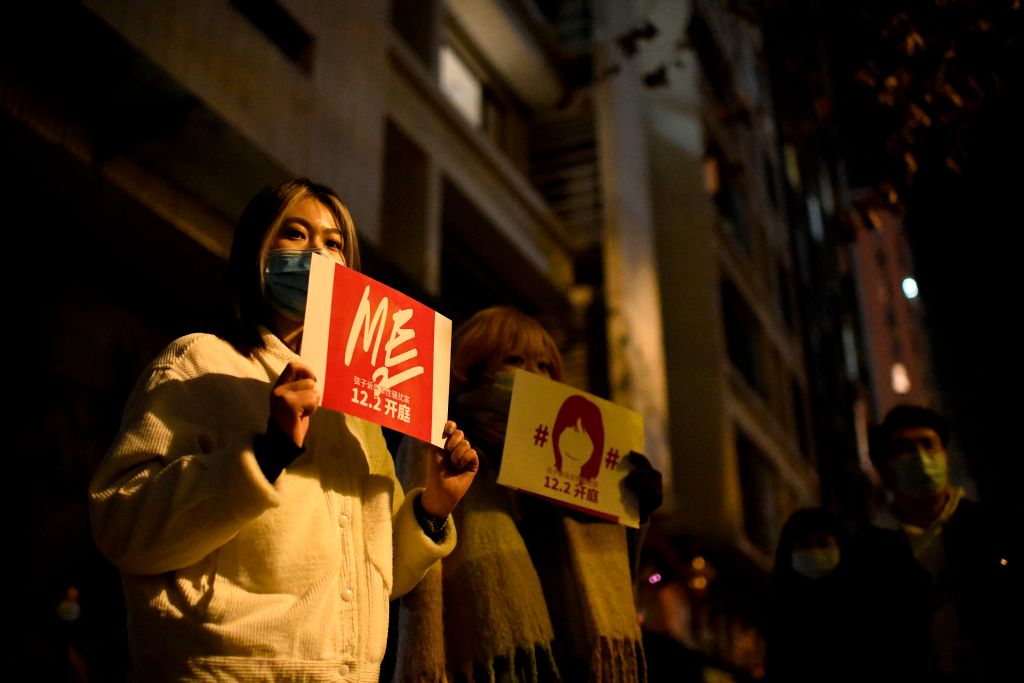The employee alleged that she was forced to drink heavily at a banquet during a business trip, then sexually assaulted by her boss. She informed her managers, but they did nothing and told her to keep quiet. So she staged a protest in the company canteen and posted details of her ordeal on a company message board.
The company was Alibaba, China’s e-commerce giant, and the allegation spread quickly, creating a firestorm online. Chief executive Daniel Zhang struggled to contain the damage, saying he was ‘shocked, angry and shameful’. He fired the accused manager, and the two who had failed to act were forced to resign. ‘We must rebuild, and we must change,’ he said.
The August scandal followed the Beijing arrest of Chinese-Canadian pop star Kris Wu on multiple rape allegations. Later in the month a well-known Hunan TV host was also accused of rape. In a long online post, his alleged victim said she had audio, video and text evidence that he drugged and assaulted her two years ago. Sexual harassment has rapidly become one of most discussed topics on Chinese social media. Even state media has waded in, highlighting the events at Alibaba. The Communist party’s anti-corruption watchdog has warned that it will crack down on a corporate culture of heavy drinking and ban karaoke songs with ‘harmful’ lyrics.
This has raised the tantalizing question of whether China is facing its #MeToo moment — and how that will be met by a male-dominated and deeply paranoid Chinese Communist party.
A culture of boorish drinking and entertaining, sexual discrimination and casual harassment is widespread in the Chinese workplace. In the past, most efforts to draw attention to abuse have faced CCP censorship and intimidation. Activists trying to give momentum to #MeToo in China have been arrested and face online harassment and abuse from nationalist trolls. And the law is stacked heavily against those seeking justice.
He Qian, a former journalist, became the face of the #MeToo movement in China two years ago when she accused a well-known journalist of sexual assault. The case finally came to court this year, but the judge ruled against her and ordered her to pay legal fees and damages for having ‘defamed’ the accused. She said she would continue to press her case, and critics charged the court with denying the existence of sexual harassment.
This was not an isolated example. Courts routinely give stronger protection to alleged harassers than to their victims, who must prove their claims to a ‘high degree of likelihood’ (typically between 75 and 85 percent certainty).
Huang Xueqin, another journalist and prominent #MeToo activist who sought to draw attention to harassment, was detained for three months in 2019 for ‘picking quarrels and provoking trouble’. A group of young activists called ‘the Feminist Five’ were arrested in 2015 on the same charge after they tried to draw attention to harassment on public transport.
In March, Xiao Meili, a close associate of the Feminist Five, went for dinner with friends to a hotpot restaurant in Chengdu. She asked a man sitting nearby to stop smoking, and received a barrage of abuse. The man then tipped the oily liquid from the hotpot over Xiao; she went to the police, who refused to take sides. Xiao posted a video of the incident, filmed with her mobile phone, and it went viral. She was bombarded with misogynistic online comments — many from nationalist trolls who conflate women’s rights with ‘foreign influence’.
Discrimination runs deep in China. Few companies have mechanisms to deal with it, and although the country has enacted a number of laws targeting sexism and workplace harassment, they are poorly enforced. Women face widespread job discrimination based on marital or parental status; companies avoid hiring — or get rid of — those who are likely to become pregnant.
The education ministry recently provoked an online storm when it suggested that young Chinese men had become too ‘feminine’ and proposed school athletics programs to correct it. There was further outrage when a commentator with state broadcaster CCTV asked an Olympic gold medalist shot-putter whether she would change her ‘masculine appearance’ to find a husband. In September the government weighed in against ‘sissy idols’ and ‘effeminate men’ in the entertainment industry.
Skeptics point out that the current furor suits the Communist party well. Alibaba, and big tech more generally, are targets of an official clampdown, so all the better if the scandal is damaging. Entertainers are fair game too — the party prefers them far removed from politics. The CCP may be calculating that it can channel anti-#MeToo outrage in much the same way that it channels online nationalism against those perceived to have offended China. If the sexual assault accusations had involved a party official or party-linked entity, it is unlikely that discussion would be tolerated — or that the case would ever have come to light at all.
‘Women hold up half the sky,’ Mao Zedong wrote, a slogan often trotted out to demonstrate his supposed commitment to equality. In fact, as many biographies testify, Mao was a sexual predator. He abandoned his four wives and most of his children, and as he sank into decrepitude he preyed on young women. He’s hardly an avatar of even-handedness for a party that remains deeply paternalistic. Xi, a dour autocrat, heads a seven-strong politburo standing committee, all men on the downhill side of middle age. Beneath them the 25-member politburo has just one woman. The ratio improves lower down the party ranks, but not by much.
#MeToo has had a galvanizing effect in the West. In China, the ability of women’s rights groups to leverage online outrage into a wider movement is constrained by Xi’s fierce crackdown on civil society, targeting NGOs, independent-minded journalists, dissidents, academics and lawyers. Feminists still face a Communist party suspicious and intolerant of anything that smacks of organized opposition, or indeed of everything beyond its control.
This article was originally published in The Spectator’s October 2021 World edition.


















